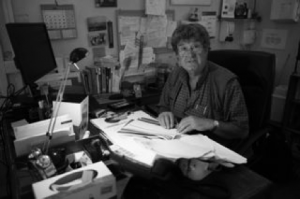 David Zigmond was a small practice GP in south London 1977-2016. You can
David Zigmond was a small practice GP in south London 1977-2016. You can
read Obituary for St James Church Surgery here.
Corporatism often enlarges and entrenches itself by increasing demands for compliance. Eventually though, unchecked, this will sicken any organisation. Such is now evidently ailing our NHS. A brief glimpse from a small conference provides a sample.
November 2016, London. A small conference of (mostly junior) doctors. The brief: to better survive the increasing stresses of their work. They are being mentored, guided, enabled and reassured by evidently concerned and sympathetic senior clinicians and cohort managers.
Supportive, ventilatory and distracting strategies are suggested: these may palliate, encourage and help endurance.
Discussion turns to appraisals: how tiring, gruelling, dispiriting and stressful they are.
Discussion turns to appraisals: how tiring, gruelling, dispiriting and stressful they are. An older patrician-clinician, Dr O, is able to reassure with statesmanlike knowledge and know-how. Yes, appraisals are an unpleasant, inordinate and major stress for many doctors, Dr O agrees. But he can personally help with this: he knows how the system operates, and who operates it: Dr X, for example. Dr X is very senior in the appraisal hierarchy and wants to be helpful to our many needlessly and haplessly struggling doctors. He can pass on many tricks, feints and shortcuts to neutralise the formidable administrative obstacles and find easier ways to demonstrate the compliance now essential for professional survival. Yes, Dr O continued, these are testing and perilous times but there are those – like Dr X – who will provide sanctuary, ‘a safe house’, help with ersatz documentation. The important thing is that we find ways to tender what we must: to survive.
As I listen to these exchanges I recall heroic stories from World War II: of resistance movements stealthily sheltering, then smuggling to safety, downed allied airmen; of Oscar Schindler duplicitly providing false documentation and work to protect those otherwise doomed. Dr X seemed, to me, like Schindler and Dr O his discrete emissary.
All these efforts, albeit unintentionally, perpetuate a bad and destructive system.
I admired all these caring and protective seniors and the responsibility they showed for the welfare and survival of their juniors. Yet I was doubtful of the larger benefit that would come from these sincere and substantial efforts: to help these tired and craven doctors to pass muster, comply to regulations they experience as draconian, and then survive-by-adaptation with the mandatory documentation. All these efforts, albeit unintentionally, perpetuate a bad and destructive system. Adaptation via obedience can easily turn to collusion.
I attempted, with respectful diplomacy, to say this. I summarised briefly: “I really like the comforting care, support and healing that’s being offered between you. But something much bigger is being ignored: the unsustainable, toxic and oppressive environment we all have to work in. These forces overwhelm and fatally undertow all our attempts to mitigate or repair…”
I had wanted to offer a brief profile of the component-agents of our pathogenic healthcare culture: how the 4Cs – commercialisation, commodification, corporatisation and computerisation – are driving out the human and vocational heart of our work; how our erstwhile (mostly) humanly gratified professional ‘families’ are displaced by managerially driven and depersonalised systems of ‘factories’; how our health services’ administrative devices all drive the larger system that is so ailing and alienating us. The entire Internal Market, Commissioning and Inspection cultures, in their many guises, all contribute: autarkic NHS Trusts, financially-based competitive commissioning; burgeoning performance-related targets with their necessary machinery for monitoring, data, negotiation and penalties; the resulting, ever-increasing need for compliance, surveillance, policing, documentation and (to mop up any surviving outliers) strictly regulated professional appraisal and validation …
But the chairperson arrested the beginning of this flow. She judged it well beyond the scope of this meeting: how may clinicians now best survive?
***
During a short break a veteran manager approaches me. “I know what you want to say. Almost everyone here would agree with you. But there’s nothing we can do about these things: they are far too big for us to influence them”, she says with fraternal commiseration. “In any case, this is not the right forum”, she adds with cautioning advice.
“Well, there never is a ‘right forum’ for discussion of these crucial things now. This recurrent exclusion is not accidental. It is the tip of a systemic iceberg: it tells us much about the size and nature of our problems. Paradoxically, our lack of open discussion indicates why we must talk candidly. And if not now, when?”, I replied.
The manager seems attentive to this but says nothing. She meets my gaze and offers me a brief smile. To me this seemed unjoyfully complex: contrition, appeasement, fear, alliance, apology, irony and respectful pity. I smiled back, wondering what she saw.
She turned to join Dr O. They re-entered the conference room.
—–0—–
Interested? Many articles exploring similar themes are available via David Zigmond’s home page on www.marco-learningsystems.com









